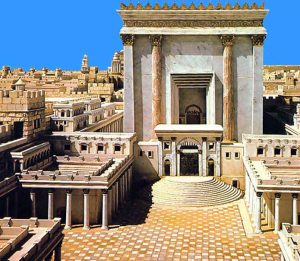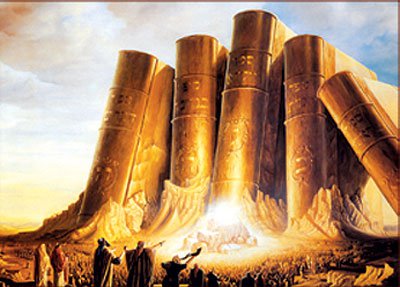Dedicated l’iluy nishmas Matisyahu ben Henoch
![]()

Giving to Ourselves
Our reading this week begins with Hashem’s instruction to Moshe to “take for Me an offering” (Ex. 25:2).
The Yalkut asks, as King David wrote in Tehillim (Psalms), “to Hashem is the land and all its fullness” (24:1). Hashem doesn’t need anything from us, He already owns it all. So why, then, does He command that we give offerings? The question is strengthened because the Israelites were not told to “give to Me an offering,” but rather to “take for Me.”
The point is that Hashem does not need to receive our offerings; rather, we need to give them. Per the commandment, we take, we acquire, when we give.
Rashi explains that there are three types of gifts that were all part of this instruction. One was a donation “by the head,” for the Adanim, the sockets that held the Tabernacle together. The second was the annual donation into the fund from which the daily offerings were purchased, which was also “by the head.” And then, finally, this included the gifts to build the rest of the Tabernacle, which were voluntary donations based upon what the donor could give and had in his heart to give.
Two out of these three gifts were mandatory, and limited to a fixed amount “by the head.” Everyone was equal for those foundational gifts, and the wealthy had the opportunity to give more after that.
A great deal is said about the spiritual benefits of giving charity, how the person giving to the Tabernacle was indeed “taking” for himself. But the benefits are more practical as well.
Think about the way you enter a house in which you are a guest, versus the place you call home. Ownership brings with it a feeling of comfort, and relaxation.
The Holy Temple was great, majestic, and imposing. It was quite justifiably frightening to enter. But at the same time, every person could see the Cohanim going about their work, bringing the holy offerings, and realize that they owned, in some small measure, those daily gifts. They were owned by the entirety of Israel, of course, but each individual knew that his half shekel gift helped the Temple to function.
This year of mourning my father’s passing has helped me realize the value of ownership in a shul (synagogue). In “my” shul I know I am likely to be able to lead the service (as is customary during this year, or eleven months of it). I am comfortable because I know the nusach (order of prayer) that they use, what extra prayers are said, and how slowly or quickly they expect me to go. But, more than that, I know that my participation helps the shul to function, and it is, to whatever small extent, “mine.” I’m not a guest, I’m a participant. And that, of course, also translates to a greater feeling of responsibility to maintain and improve it.
That is why Hashem wanted each and every Jew to participate in the Tabernacle and the offerings, to have that feeling of belonging. By giving to shuls, schools, and Torah projects, you take a part in all of the praying and learning that results. It’s not just that we belong to shuls, to organizations, to Torah learning (such as Torah.org!), but that through our gifts, they belong to us, and we feel what is already true: that we are part of something greater than ourselves, and a key part all the same.
Good Shabbos,
Rabbi Yaakov Menken
![]()
Terumah and Maaser Nowadays
See it at JewishAnswers.org
Question: What is done with terumah and maaser nowadays?
Answer:
Nowadays the Levites’ tithe is separated and kept (since anyone can eat it); the kohanim’s 1% (plus a token amount for terumah) is separated and destroyed (because it can only be eaten in a state of ritual purity, which is no longer possible); the second tithe is redeemed for a token amount, which is destroyed, or in the third and sixth years its value is given to charity.
![]()
Terumah – Receiving Torah, Receiving God
Rabbi Ari Goldwag
Hear it at TorahMedia.com
Ari Goldwag (born 1979) is an American Orthodox Jewish singer, songwriter, composer, and producer of contemporary Jewish religious music, as well as an author and teacher living in Ramat Beit Shemesh, Israel. He was a soloist for the Miami Boys Choir at age 10 and starred on five albums and three videos before his voice changed at age 14.
Recent Articles
See all of our recent additions
Browse all our articles on Terumah
Featured Article:
A Heart of Wood
By Rabbi Naftali Reich
It was breathtakingly beautiful, but ordinary human eyes never feasted on it. Secluded inthe Holy of Holies, the holy Ark of the Torah was visited only once a year – by the High Priest on Yom Kippur, the holiest day on the Jewish calendar. Nevertheless, the Arks glittering beauty, transcendent holiness and aura of mystery loom large in history and legend.
The Ark sits at the very core of Judaism. It is the eternal depository of the Tablets that Moses received directly from Hashem on Mount Sinai, and as such, it is the ultimate symbol of the power and glory of the Torah. It is the crown jewel of the Temple, a spectacular vision of pure gleaming gold adorned with two golden winged cherubs. Not surprisingly, therefore, the Ark is popularly known as “the golden Ark.”
But that is not how the Torah describes it. “And they shall make an Ark of cedarwood,” the Torah declares. Then the Torah goes on to describe how this Ark is to be constructed. A wooden ark is placed inside a golden ark. Then a second golden ark is placed inside the wooden ark. The rim is then covered with gold, effectively encapsulating the wooden ark entirely in gold. The Talmud explains that this is meant to signify that a true Torah scholar is equally pure within and without.












